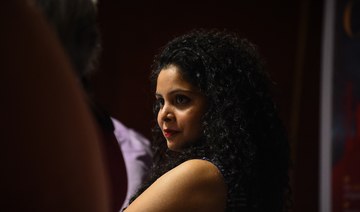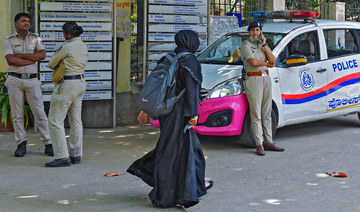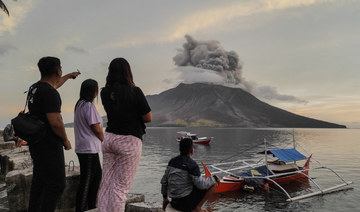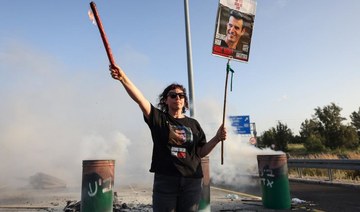NEW DELHI: A recent court ruling upholding a ban on Muslim students wearing head coverings in schools has sparked criticism from constitutional scholars and rights activists amid concerns of judicial overreach regarding religious freedoms in officially secular India.
Even though the ban is only imposed in the southern state of Karnataka, critics worry it could be used as a basis for wider curbs on Islamic expression in a country already witnessing a surge of Hindu nationalism under Prime Minister Narendra Modi’s governing Bharatiya Janata Party.
“With this judgment, the rule you are making can restrict the religious freedom of every religion,” said Faizan Mustafa, a scholar of freedom of religion and vice chancellor at the Hyderabad-based Nalsar University of Law. “Courts should not decide what is essential to any religion. By doing so, you are privileging certain practices over others.”
Supporters of the decision say it’s an affirmation of schools’ authority to determine dress codes and govern student conduct, and that takes precedence over any religious practice.
“Institutional discipline must prevail over individual choices. Otherwise, it will result in chaos,” said Karnataka Advocate General Prabhuling Navadgi, who argued the state’s case in court.
Before the verdict more than 700 signatories including senior lawyers and rights advocates had expressed opposition to the ban in an open letter to the court’s chief justice, saying, “the imposition of an absolute uniformity contrary to the autonomy, privacy and dignity of Muslim women is unconstitutional.”
The dispute began in January when a government-run school in the city of Udupi, in Karnataka, barred students wearing hijabs from entering classrooms. Staffers said the Muslim headscarves contravened the campus’ dress code, and that it had to be strictly enforced.
Muslims protested, and Hindus staged counterdemonstrations. Soon more schools imposed their own restrictions, prompting the Karnataka government to issue a statewide ban.
A group of female Muslim students sued on the grounds that their fundamental rights to education and religion were being violated.
But a three-judge panel, which included a female Muslim judge, ruled last month that the Qur’an does not establish the hijab as an essential Islamic practice and it may therefore be restricted in classrooms. The court also said the state government has the power to prescribe uniform guidelines for students as a “reasonable restriction on fundamental rights.”
“What is not religiously made obligatory therefore cannot be made a quintessential aspect of the religion through public agitations or by the passionate arguments in courts,” the panel wrote.
The verdict relied on what’s known as the essentiality test — basically, whether a religious practice is or is not obligatory under that faith. India’s constitution does not draw such a distinction, but courts have used it since the 1950s to resolve disputes over religion.
In 2016, the high court in the southern state of Kerala ruled that head coverings were a religious duty for Muslims and therefore essential to Islam under the test; two years later India’s Supreme Court again used the test to overturn historical restrictions on Hindu women of certain ages entering a temple in the same state, saying it was not an “essential religious practice.”
Critics say the essentiality test gives courts broad authority over theological matters where they have little expertise and where clergy would be more appropriate arbiters of faith.
India’s Supreme Court is itself in doubt about the test. In 2019 it set up a nine-judge panel to reevaluate it, calling its legitimacy regarding matters of faith “questionable”; the matter is still under consideration.
The lawsuit in Karnataka cited the 2016 Kerala ruling, but this time the justices came to the opposite conclusion — baffling some observers.
“That’s why judges make for not-so-great interpreters of religious texts,” said Anup Surendranath, a professor of constitutional law at the Delhi-based National Law University.
Surendranath said the most sensible avenue for the court would have been to apply a test of what Muslim women hold to be true from a faith perspective: “If wearing hijab is a genuinely held belief of Muslim girls, then why ... interfere with that belief at all?”
The ruling has been welcomed by Bharatiya Janata Party officials from Mukhtar Abbas Naqvi, the federal minister of minority affairs, to B. C. Nagesh, Karnataka’s education minister.
Satya Muley, a lawyer at the Bombay High Court, said it’s perfectly reasonable for the judiciary to place some limits on religious freedoms if they clash with dress codes, and the verdict will “help maintain order and uniformity in educational institutions.”
“It is a question of whether it is the constitution, or does religion take precedence?” Muley said. “And the court’s verdict has answered just that by upholding the state’s power to put restrictions on certain freedoms that are guaranteed under the constitution.”
Surendranath countered that the verdict was flawed because it failed to invoke the three “reasonable restrictions” under the constitution that let the state interfere with freedom of religion — for reasons of public order, morality or health.
“The court didn’t refer to these restrictions, even though none of them are justifiable to ban hijabs in schools,” Surendranath said. “Rather, it emphasized homogeneity in schools, which is opposite of diversity and multiculturalism that our constitution upholds.”
The Karnataka ruling has been appealed to India’s Supreme Court. Plaintiffs requested an expedited hearing on the grounds that a continued ban on the hijab threatens to cause Muslim students to lose an entire academic year. The court declined to hold an early hearing, however.
Muslims make up just 14 percent of India’s 1.4 billion people, but nonetheless constitute the world’s second-largest Muslim population for a nation. The hijab has historically not been prohibited or restricted in public spheres, and women donning the headscarf — like other outward expressions of faith, across religions — is common across the country.
The dispute has further deepened sectarian fault lines, and many Muslims worry hijab bans could embolden Hindu nationalists and pave the way for more restrictions targeting Islam.
“What if the ban goes national?” said Ayesha Hajjeera Almas, one of the women who challenged the ban in the Karnataka courts. “Millions of Muslim women will suffer.”
Mustafa agreed.
“Hijab for many girls is liberating. It is a kind of bargain girls make with conservative families as a way for them to go out and participate in public life,” he said. “The court completely ignored this perspective.”
Indian scholars, activists criticize school hijab ban ruling
https://arab.news/vkjs2
Indian scholars, activists criticize school hijab ban ruling
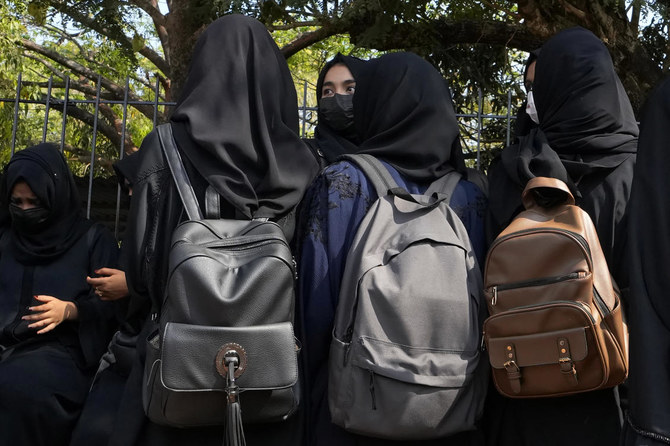
- Muslims protested, and Hindus staged counterdemonstrations
- Soon more schools imposed their own restrictions, prompting the Karnataka government to issue a statewide ban
Philippine bishops instruct flock to pray for rain, heat relief
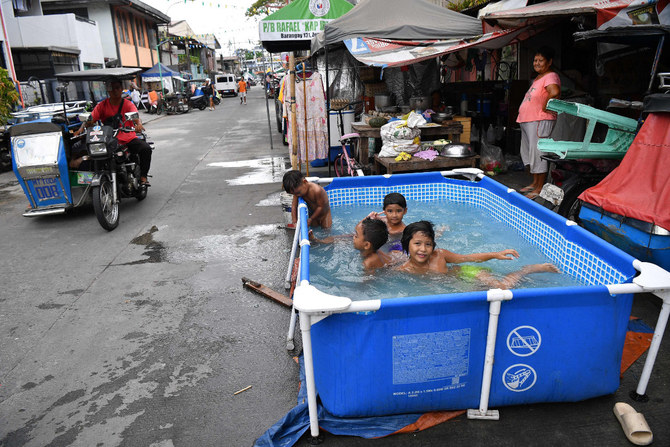
- Rising temperatures have forced the government to shut down tens of thousands of schools over the past week
- Increased demand has also stressed the country’s already strained power supply
MANILA: Catholic bishops in the Philippines are pitching in to seek divine relief from the extreme heatwave scorching the country, instructing their flock to recite special prayers for rain and lower temperatures.
Rising temperatures have forced the government to shut down tens of thousands of schools over the past week, while increased demand has stressed the country’s already strained power supply.
A widespread El Nino drought that began early this year is compounding the problem, ruining 5.9 billion pesos ($103 million) worth of farm produce so far according to the Department of Agriculture.
The Catholic Bishops Conference of the Philippines issued an “Oratio Imperata,” instructing parishes in the mainly Catholic nation to recite a prayer for deliverance from calamities during masses, according to the text seen by AFP on Saturday.
“We humbly ask you to grant us relief from the extreme heat that besets your people at this time, disrupting their activities and threatening their lives and livelihood,” the prayer read.
“Send us rain to replenish our depleting water sources, to irrigate our fields, to stave off water and power shortages and to provide water for our daily needs.”
A record-high 38.8 degrees Celsius (101.8 degrees Fahrenheit) was recorded in the capital Manila on April 27, forcing the closure of more than 47,000 schools for two days.
Nearly 8,000 schools remained shuttered as of Friday, the education department said, while the highest temperature in the country was recorded at 38.2C on the island of Mindoro south of the capital.
Indonesia to permanently relocate 10,000 people after Ruang volcano eruptions
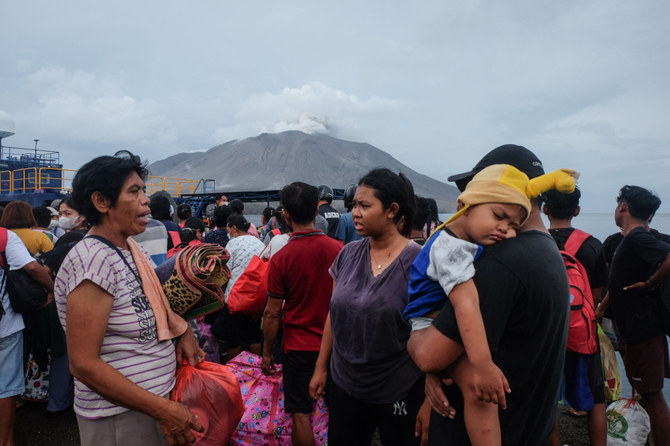
- Authorities warned of the a possible tsunami if parts of the mountain collapse into the surrounding waters
- Indonesia straddles the “Pacific Ring of Fire,” an area of high seismic activity where multiple tectonic plates meet
JAKARTA: The Indonesian government will permanently relocate almost 10,000 residents after a series of explosive eruptions of the Ruang volcano has raised concerns about the dangers of residing on the island in future, a minister said on Friday.
About 9,800 people live on Ruang island, in the province of North Sulawesi, but in recent weeks all residents have been forced to evacuate after the mountain has continued to spew incandescent lava and columns of ash kilometers into the sky.
Authorities this week raised the alert status of the volcano to the highest level, closed the provincial airport in Manado, and also warned of the a possible tsunami if parts of the mountain collapse into the surrounding waters.
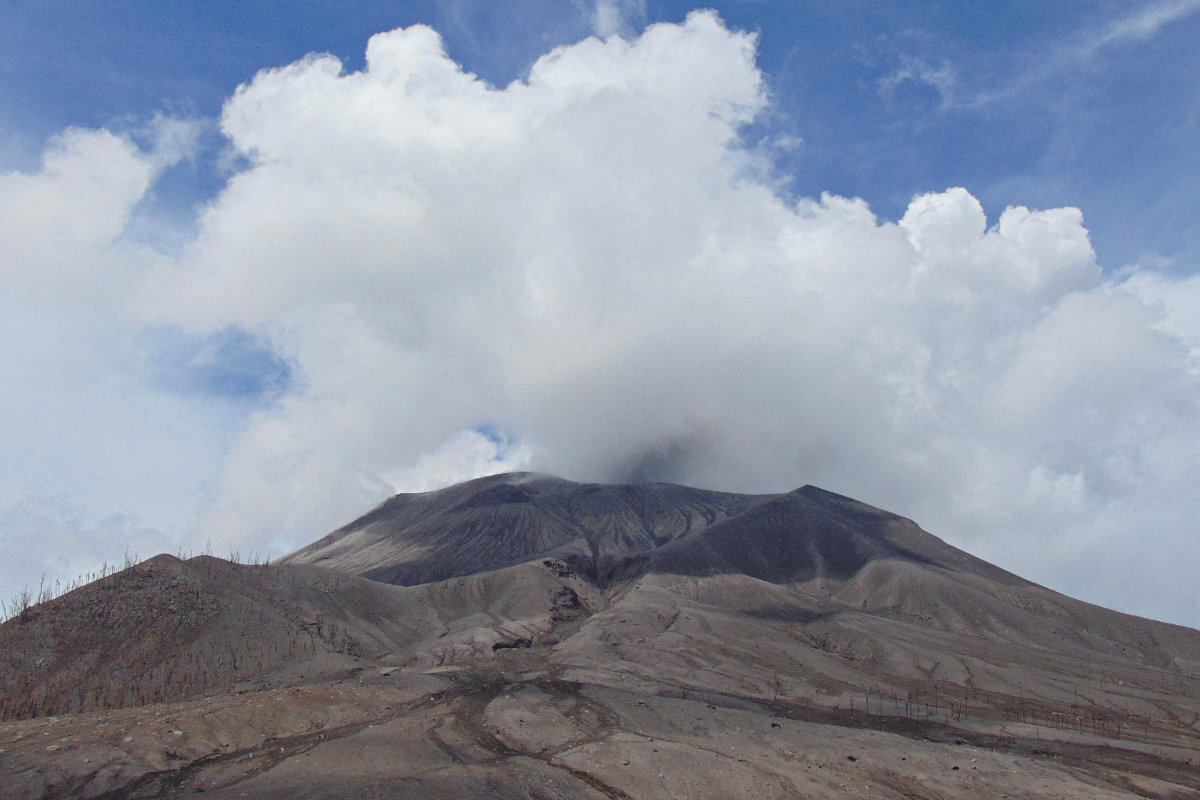
Hundreds of “simple but permanent” homes would be built in the Bolaang Mongondow area to facilitate the relocations, said coordinating human development minister Muhadjir Effendy, after a cabinet meeting to discuss the volcano on Friday.
“As instructed by President Joko Widodo, we will build houses that meet disaster-standards,” he said, adding that the site was located about 200 km (125 miles) from Ruang island.
Mount Ruang began to dramatically erupt last month, with experts saying the eruptions were triggered by increased seismic activity, including deep sea earthquakes.
The mountain erupted again on Tuesday, causing damage to some homes and forcing residents to evacuate from the Tagulandang island, where they had initially sought refuge, to the provincial capital of Manado.
Roads and buildings on Tagulandang were blanketed in a thick layer of volcanic ash, and the roofs of some homes had collapsed, according a Reuters witness.
The volcano had not erupted on Friday but Manado’s Sam Ratulangi Airport remained closed until the evening due to the spread of volcanic ash.
Indonesia straddles the so-called “Pacific Ring of Fire,” an area of high seismic activity where multiple tectonic plates meet.
US congressman praises heckling of war protesters, including 1 who made monkey gestures at Black woman
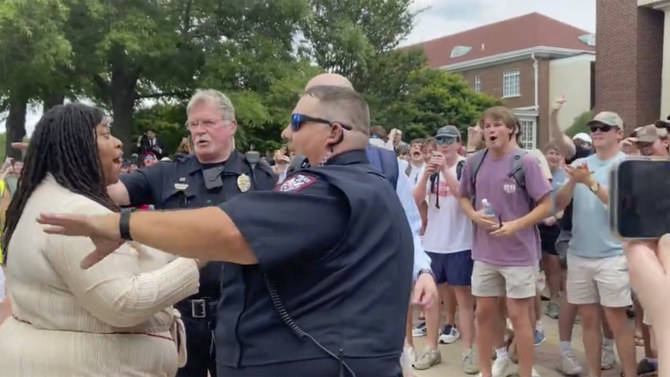
JACKSON, Mississippi: Israel-Hamas war demonstrations at the University of Mississippi turned ugly this week when one counter-protester appeared to make monkey noises and gestures at a Black student in a raucous gathering that was endorsed by a far-right congressman from Georgia.
“Ole Miss taking care of business,” Republican US Rep. Mike Collins wrote Friday on the social platform X with a with a link to the video showing the racist jeers.
The Associated Press left voicemail messages for Collins on Friday at his offices in Georgia and Washington and sent an email to his spokesperson, asking for an explanation of what Collins meant. There was no immediate response.
The taunting brought sharp criticism on and off campus.
“Students were calling for an end to genocide. They were met with racism,” James M. Thomas, a sociology professor at the University of Mississippi, wrote Friday on X.
The Rev. Cornell William Brooks, a former president and CEO of the NAACP and professor at the John F. Kennedy School of Government at Harvard University, wrote on X that a white man mocking a Black woman as a monkey “isn’t about ‘Stand With Israel’ or ‘Free Palestine.’ This is protest as performative racism.”
Collins was first elected to Congress in 2022 and made several social media posts criticizing campus protests.
Nobody was arrested during the demonstration Thursday at the University of Mississippi, where hecklers vastly outnumbered war protesters. According to a count by AP, more than 2,400 arrests have occurred on 46 US university or college campuses since April 17 during demonstrations against the war.
The student newspaper, The Daily Mississippian, reported about 30 protesters on the Oxford campus billed themselves as UMiss for Palestine. Videos and photos from the event showed the protesters were in a grassy area near the main library, blocked off by barriers erected by campus security.
They chanted “Free, free Palestine,” and carried Palestinian flags and signs with slogans including, “Stop the Genocide” and “US bombs take Palestine lives.”
Student journalist Stacey J. Spiehler shot video that showed campus police officers and the dean of students standing between anti-war protesters and hecklers. After the Black woman protesting the war had what appeared to be a heated exchange of words with several white hecklers, one of the men made the monkey gestures and noises at her.
About 76 percent of the university’s students were white and about 11 percent were Black in 2022-23, the most recent data available on the school’s website.
University of Mississippi Chancellor Glenn Boyce said the school is committed to people expressing their views. He said some statements made on campus Thursday were “offensive and unacceptable.”
Republican Gov. Tate Reeves reposted a video on X that showed counter-protesters on the campus singing “The Star-Spangled Banner.”
“Warms my heart,” Reeves wrote. “I love Mississippi!”
US campus protests wane after crackdowns, Biden rebuke
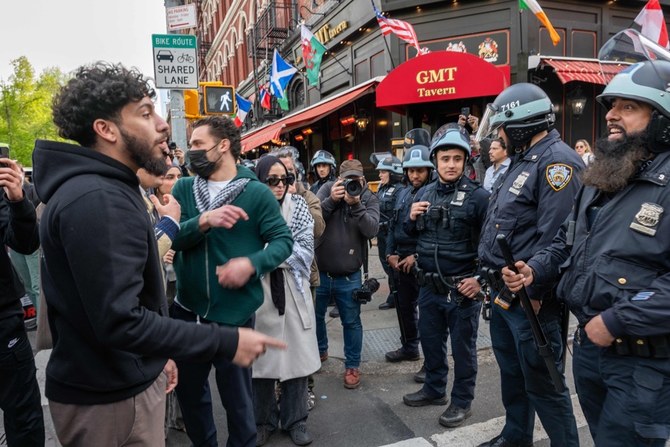
- More than 2,000 arrests have been made in the past two weeks across the US
NEW YORK: Pro-Palestinian protests that have rocked US campuses for weeks were more muted Friday after a series of clashes with police, mass arrests and a stern White House directive to restore order.
Police in Manhattan cleared an encampment at New York University after sunrise, with video posted to social media by an official showing protesters exiting their tents and dispersing when ordered to do so.
The scene appeared relatively calm compared to crackdowns at other campuses around the country — and some worldwide — where protests over Israel’s war against Hamas in Gaza have multiplied in recent weeks.
University administrators, who have tried to balance the right to protest and complaints of violence and hate speech, have increasingly called on police to clear out the demonstrators ahead of year-end exams and graduation ceremonies.
At the University of Chicago, law enforcement appeared set to dismantle an encampment Friday after the school’s president said talks with protesters on a compromise had failed.
Before the clearing operation began, dozens of American flag-wielding counter-protesters showed up and confronted the pro-Palestinian group, but police separated the two sides, local media reported.
More than 2,000 arrests have been made in the past two weeks across the US, some during violent confrontations with police, giving rise to accusations of use of excessive force.
President Joe Biden, who has faced pressure from all political sides over the conflict in Gaza, gave his first expansive remarks on the protests Thursday, saying that “order must prevail.”
“We are not an authoritarian nation where we silence people or squash dissent,” Biden said in a brief address from the White House.
“But neither are we a lawless country. We’re a civil society, and order must prevail.”
His remarks came hours after police moved in on demonstrators at the University of California, Los Angeles, which had seen a violent confrontation when counter-protesters attacked a fortified encampment there.
A large police contingent forcibly cleared the sprawling encampment early Thursday while flashbangs were launched to disperse crowds gathered outside.
Schools officials said that more than 200 people were arrested.
On the US East coast Thursday, protesters at New Jersey’s Rutgers University agreed to take down their camp after reaching a compromise with administrators — a similar deal to one made at Brown University in Rhode Island.
Republicans have accused Biden of being soft on what they say is anti-Semitic sentiment among the protesters, while he faces opposition in his own party for his strong support for Israel’s military offensive.
“There should be no place on any campus, no place in America for anti-Semitism, or threats of violence against Jewish students,” Biden said.
Education Secretary Miguel Cardona echoed the condemnation in a letter to university leaders on Friday, pledging to investigate reports of anti-Semitism “aggressively,” CNN reported.
Meanwhile, similar student protests have popped up in countries around the world, including in Australia, France, Mexico and Canada.
In Paris, police moved in to clear students staging a sit-in at the Sciences Po university.
An encampment has grown at Canada’s prestigious McGill University, where administrators on Wednesday demanded it be taken down “without delay.”
However, police had yet to take action against the site as of Friday.
The Gaza war started when Hamas militants staged an unprecedented attack on Israel on October 7 that resulted in the deaths of more than 1,170 people, mostly civilians, according to an AFP tally of Israeli official figures.
Israel estimates that 128 hostages remain in Gaza. The Israeli military says 35 of them are dead.
Israel’s retaliatory offensive has killed more than 34,600 people in Gaza, mostly women and children, according to the Hamas-run territory’s health ministry.
Biden to host Jordan king next week amid Gaza talks

- Hamas accused Israeli Prime Minister Benjamin Netanyahu on Friday of trying to derail the proposed Gaza deal with his threats to launch an operation in Rafah
- Israel has killed more than 34,000 Palestinians in Gaza, mostly women and children, according to the health ministry in the Hamas-run territory
WASHINGTON: US President Joe Biden will host Jordan’s King Abdullah II next week, the White House said Friday, as negotiations continue in the Middle East for a ceasefire in Gaza.
The meeting will be “private” and will be followed by a readout, White House Press Secretary Karine Jean-Pierre told reporters, without giving a date for the encounter.
The meeting comes against the backdrop of talks for a deal to release hostages and secure a ceasefire between Israel and Hamas in Gaza after nearly seven months of war.
The talks, which come after months of efforts by mediators Egypt, Qatar and the United States to broker a new agreement between the combatants, are at a critical juncture.
The United States has urged the Palestinian militant group to accept the “extraordinarily generous” offer.
But Hamas accused Israeli Prime Minister Benjamin Netanyahu on Friday of trying to derail the proposed Gaza deal with his threats to launch an operation in Rafah.
King Abdullah II last visited the White House in February when he called for an immediate ceasefire and warned an attack on Rafah would cause a “humanitarian catastrophe.”
In April, Jordan worked alongside the United States and other allies to shoot down Iranian drones that Tehran sent toward Israel, with the kingdom keen to avoid a wider conflict.



